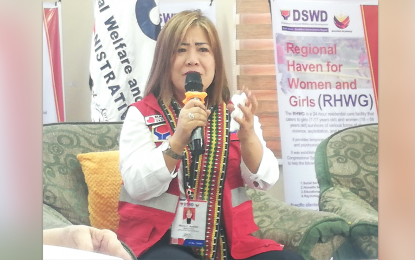
PROJECT BRIEFING. Department of Social Welfare and Development-Cordillera Director Maria Aplaten briefs the media on “Project Lawa” (Local Adaptation for Water Access) during the Bagong Pilipinas press conference in Baguio City on Tuesday (June 11, 2024). The project is set to benefit more than 8,300 individuals in 221 barangays. (PNA photo by Liza T. Agoot)
BAGUIO CITY – The “Project Lawa” (Local Adaptation for Water Access) of the Department of Social Welfare and Development in the Cordillera Administrative Region (DSWD-CAR) is eyed as a possible source of potable water for households during the rainy season and all year round.
“The reservoir's water source is at the top of the mountains, where there are natural springs. We need to coordinate with local water distributors for regulation, but they could be used as water for the households,” Novella Pocding, officer-in-charge of the Disaster Risk Reduction Management Committee of the DSWD-CAR, said during the “Bagong Pilipinas” press conference here on Tuesday.
During the El Niño, Pocding said the recipients connected hose to the reservoir to distribute water to their gardens and homes.
“We could do this, but we have to check on the water potability and have the concessionaires in the areas assess and monitor the supply,” she said.
Maria Aplaten, DSWD-CAR director, said that from an initial 30 projects constructed last year –10 each for the municipalities of Hunduan, Asipulo, and Aguinaldo in Ifugao, the DSWD central office saw its potentials and extended the implementation to 221 more barangays in 32 municipalities in the region.
“We hope to complete all 221 by this month and start the payment for those who worked to accomplish the project LAWA’s reservoir component,” she said, adding that the recipient community will undertake maintenance upon completion.
Aplaten said Project Lawa recognizes the applicability of indigenous knowledge systems that can be adopted to improve the lives of the people in the communities.
The Ifugao practice of the “muyong” system, whereby rice terraces at the lower portion of the mountain are supported by establishing a forest on the upper area, ensuring a sustained supply of water for the lower portions, was the concept for the initial 30 projects in the Ifugao three towns.
Some 8,348 individuals will benefit from the reservoir project once 221 projects are completed, Aplaten said. (PNA)
